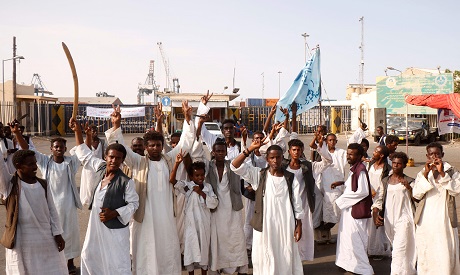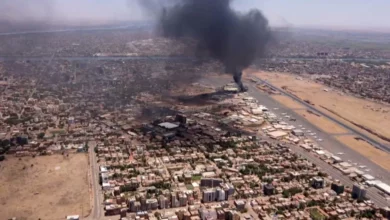
CAIRO (AP) — Tribal protesters on Monday lifted their weekslong blockade on Sudan’s main seaport and oil pipelines, and reopened roads linking the port to the rest of the country, a tribal leader said, following a deal with the military to remove the barricades for one month.
The development comes a week after the military dissolved the transitional government in a widely condemned coup in Sudan that threatens to further derail the country’s already fragile transition after a popular uprising forced the removal of longtime autocrat Omar al-Bashir in April 2019.
Pro-democracy activists have accused the military of engineering the port blockade and another pro-military protest outside the presidential place in the Sudanese capital, Khartoum, to deflect from their military takeover of the country.
Kamal Sayed, secretary general of the Baja tribal council, told The Associated Press the tribal leaders have reached a deal with the military to lift the blockade of the Red Sea port and oil pipelines, and reopen roads in the eastern city of Port Sudan for one month, to allow the formation of a new government.
The council represents six nomadic tribes that live in northeastern Sudan where the port is located. They have held street protests in Port Sudan for the past two months, setting up barricades and staying out on the streets to block the port, a lifeline for the country, oil pipelines and major roads.
The protesters demand the military fully dissolve the transitional government of Prime Minister Abdalla Hamdok, whom the army put under house arrest following the coup. They also demand that a peace deal struck last year with a rebel alliance in the east be renegotiated.
The generals have denied accusations of engineering the port blockade, saying that the protesters’ demands in Port Sudan and in Khartoum are legitimate and should be negotiated politically.
In the weeks before the coup, Hamdok’s government and the U.N. had tried unsuccessfully to negotiate the reopening of the port and the key roads.
Sayed, the tribal official, said the makeshift barricades at the port’s terminals and the main highway liking Port Sudan to Khartoum was removed on Monday morning. He said the barricades would be reinstated if their demands are not met.
The blockade has caused food and fuel shortages across Sudan, with the government warning last month the country was running out of essential goods, including medicines, food and wheat.
Meanwhile in Khartoum, a semblance of normalcy has returned, with several roads and bridges reopened after weeklong tensions and protests against the military’s takeover.
The U.S. Embassy in Khartoum said that movement in and around Khartoum has improved since Saturday, but that military checkpoints remain in place in several areas. Also, protesters have continued to set up makeshift barricades in some neighborhoods around Khartoum.




